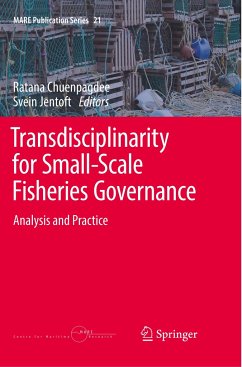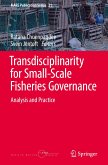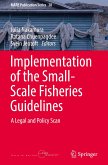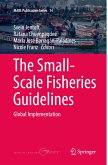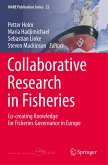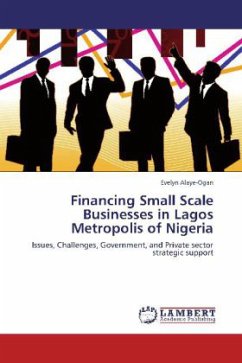The importance of small-scale fisheries for sustainable livelihoods and communities, food security, and poverty eradication is indisputable. With the endorsement of the 'Voluntary Guidelines for Securing Sustainable Small-Scale Fisheries', FAO member states recognize that governments, civil society organizations, and research communities all have a role to play in helping small-scale fisheries achieve these goals. This book argues that policies targeting small-scale fisheries need to be based on a solid and holistic knowledge foundation, and support the building of governance capacity at local, national, and global levels. The book provides rich illustrations from around the world of why such knowledge production needs to be transdisciplinary, drawing from multiple disciplinary perspectives and the knowledge that small-scale fisheries actors have, in order to identify problems and explore innovative solutions.
Transdisciplinarity for Small-Scale Fisheries Governance: Analysis and Practice, edited by Ratana Chuenpagdee and Svein Jentoft, successfully demonstrates how small-scale fisheries are important and what social and political conditions are conducive to their wellbeing. The volume contributes tremendously to building capacity of fisheries communities and policy-makers to make the ideals of small-scale fisheries a reality. It establishes the ecological, social, and economic sense behind small-scale fisheries. A milestone reference for all those who believe in small-scale fisheries and are keen to defend them with quality evidence!
- Sebastian Mathew, Executive Director, International Collective in Support of Fishworkers (ICSF)
The Small-Scale Fisheries Guidelines guiding principles call for holistic and integrated approaches for their implementation. This book will help a new generation of scientists, policy-makers, and small-scale fisheries actors make the fundamental connections between different disciplinesin science, traditional knowledge, and policy to guide a collective process towards sustainable small-scale fisheries. The book contains an inspiring collection of practical cases from around the world, complemented by deep dives into dimensions of small-scale fisheries, like food security, stewardship, climate change, and gender, which all call for transdisciplinary approaches.
- Nicole Franz, Fisheries and Aquaculture Department, Food and Agriculture Organization of the United Nations (FAO) Rome, Italy
Transdisciplinarity for Small-Scale Fisheries Governance: Analysis and Practice, edited by Ratana Chuenpagdee and Svein Jentoft, successfully demonstrates how small-scale fisheries are important and what social and political conditions are conducive to their wellbeing. The volume contributes tremendously to building capacity of fisheries communities and policy-makers to make the ideals of small-scale fisheries a reality. It establishes the ecological, social, and economic sense behind small-scale fisheries. A milestone reference for all those who believe in small-scale fisheries and are keen to defend them with quality evidence!
- Sebastian Mathew, Executive Director, International Collective in Support of Fishworkers (ICSF)
The Small-Scale Fisheries Guidelines guiding principles call for holistic and integrated approaches for their implementation. This book will help a new generation of scientists, policy-makers, and small-scale fisheries actors make the fundamental connections between different disciplinesin science, traditional knowledge, and policy to guide a collective process towards sustainable small-scale fisheries. The book contains an inspiring collection of practical cases from around the world, complemented by deep dives into dimensions of small-scale fisheries, like food security, stewardship, climate change, and gender, which all call for transdisciplinary approaches.
- Nicole Franz, Fisheries and Aquaculture Department, Food and Agriculture Organization of the United Nations (FAO) Rome, Italy

